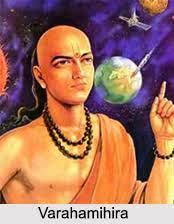Introduction
Varahamihira, also known as Varaha or Mihira, (born 505, Ujjain, India—died 587, Ujjain) was an Indian philosopher, astronomer, and mathematician who wrote the Pancha-siddhantika (“Five Treatises”), a collection of Greek, Egyptian, Roman, and Indian astronomy.
India had already been well-known and had achieved the height of astrological and astronomical sciences thousands of years ago. Many foreign languages have been translated into ancient astrological works. Ibn Batuta and Al Baruni were two famous Arab explorers who came to India specifically to research astrology. They had enticed German scholars to come to India to research Astrology and Vedic literature through their translations. Varahamihira was the only renowned Indian astronomer, mathematician, and astrologer whose name became a household word in India.
Varahamihira was born to a Brahmin family in the village of Kapittha near Ujjain. Varahamihira learned astrology from his father, Adityadasa, who was a Sun god worshipper. Varahamihira met the great astronomer and mathematician Aryabhata during a visit to Kusumapura (Patna). He was so shaken by the encounter that he wanted to try astrology and astronomy as a profession. Ujjain was the epicentre of learning at the time, with many schools of art, science, and culture thriving, thanks to the Gupta dynasty's prosperity. As a result, Varahamihira relocated to this area, which was hosting a gathering of scholars from all over the world. His astrological abilities finally caught the attention of Vikramaditya Chandragupta II, who made him one of his court's Nine Gems.
Surya Siddhanta
Before 1000 BC, people in India had begun to use astronomical instruments. During this time, the ‘Suryasidhanta', a well-known book for astronomical calculations, was written.
The word ‘Suryasidhanta' means ‘sun theory,' and it refers to the measurements of star and planet positions. Some Indian mathematicians later developed their own instruments and methods to help in the understanding of the ‘Suryasidhanta' theory. One such invaluable contribution is the introduction of zero in mathematics and the decimal method of calculation. Varahamihira compared Surya Siddhanta with his four other panchsiddhantika treatises, namely Paitamaha Siddhantas, Paulisha Siddhantas, Romaka Siddhantas, and Vasishta Siddhantas. The Surya Siddhanta is also mentioned in Aryabhata's writings.
Panchsiddhanta
Varahamihira did an outstanding job of gathering five astronomical theories that were in use before Crist, one of which is suryasidhanta. The ‘Panchasidhanta' is the name given to this collection of books. He'd produced a variety of ring and string instruments.
Contributions to Mathematics
The discovery of the trigonometric formulas was one of Varahamihira's mathematical accomplishments. He improved the precision of Aryabhata's sine tables. He defined the algebraic properties of zero and negative numbers, as well as the properties of positive and negative numbers. He was also one of the first mathematicians to discover a variant of the Pascal's triangle. He used it to figure out how to measure binomial coefficients.
Other significant Contributions
Varahamihira also made some important observations in ecology, hydrology, and geology. His assertion that plants and termites can detect underground water is now gaining traction in the scientific community. He was a prolific writer as well. He was able to express himself in a unique style, thanks to his mastery of Sanskrit grammar and poetic metre. His encyclopedic knowledge and lively presentation of even the most dry topics, such as astronomy, made him a famous figure. His treatises such as Pancha Siddhantika (Five Principles), Brihatsamhita (Master Collection), and Brahjataka (Astrological work) have elevated him to the same level of Astrology as Kautilya, Manu and Panini in Political Philosophy, Law, and Grammar.









0 Comments